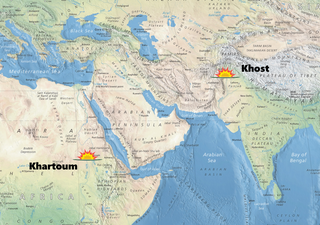
Ahmad Shah Massoud was an Afghan military leader and politician. He was a guerrilla commander during the resistance against the Soviet occupation during the Soviet–Afghan War from 1979 to 1989. In the 1990s, he led the government's military wing against rival militia, and actively fought against the Taliban, from the time the regime rose to power in 1996, and until his assassination in 2001.

Osama bin Laden was a Saudi Arabian-born Islamist dissident and militant leader who was the founder and first general emir of al-Qaeda. Ideologically a pan-Islamist, he participated in the Afghan jihad against the Soviet Union and supported the activities of the Bosnian mujahideen during the Yugoslav Wars. After issuing his declaration of war against the Americans in 1996, Bin Laden began advocating attacks targeting U.S. assets in several countries, and supervised al-Qaeda's execution of the September 11 attacks in the United States in 2001.

Operation Infinite Reach was the codename for American cruise missile strikes on al-Qaeda bases that were launched concurrently across two continents on 20 August 1998. Launched by the U.S. Navy, the strikes hit the al-Shifa pharmaceutical factory in Khartoum, Sudan, and a camp in Khost Province, Afghanistan, in retaliation for al-Qaeda's August 7 bombings of American embassies in Kenya and Tanzania, which killed 224 people and injured over 4,000 others. Operation Infinite Reach was the first time the United States acknowledged a preemptive strike against a violent non-state actor.

Joseph Cofer Black is an American former CIA officer who served as director of the Counterterrorism Center in the years surrounding the September 11th attacks, and was later appointed Ambassador-at-Large and Coordinator for Counterterrorism at the State Department by President George W. Bush, serving until his resignation in 2004. Prior to his roles combatting terrorism, Black served across the globe in a variety of roles with the Directorate of Operations at the CIA.
Howard Phillips Hart was an American Central Intelligence Agency officer. He worked as the CIA chief of station in Islamabad, Pakistan from May 1981 until 1984. He was succeeded by William Piekney in the summer of 1984. He died on April 30, 2017.

The Inter-Services Intelligence is the largest and best-known component of the Pakistani intelligence community. It is responsible for gathering, processing, and analyzing any information from around the world that is deemed relevant to Pakistan's national security. The ISI reports to its director-general and is primarily focused on providing intelligence to the Pakistani government.

Mohammad Yunus Khalis was a mujahideen commander in Afghanistan during the Soviet–Afghan War. His party was called Hezb-i-Islami, the same as Gulbuddin Hekmatyar's party. The two are commonly differentiated as Hezb-e Islami Khalis and Hezb-e-Islami Gulbuddin.

The Afghanistan–Uzbekistan Friendship Bridge is a road–rail bridge across the Oxus River in Central Asia, connecting the town of Hairatan in Afghanistan with the town of Termez in Uzbekistan. It was built by the Soviet Union and opened in 1982 as a military supply route during the Soviet–Afghan War. Today, it is used for trade and travel purposes between the two independent countries.

Gary Charles Schroen was an American intelligence officer who spent 32 years with the Central Intelligence Agency, most notably as a field officer in charge of the initial CIA incursion into Afghanistan in September 2001 to topple the Taliban and destroy Al-Qaeda. He retired as the most decorated CIA officer in history.

Steve Coll is an American journalist, academic, and executive.

Shortly after the September 11 attacks, the United States declared the war on terror and subsequently led a multinational military operation against Taliban-ruled Afghanistan. The stated goal was to dismantle al-Qaeda, which had executed the attacks under the leadership of Osama bin Laden, and to deny Islamist militants a safe base of operations in Afghanistan by toppling the Taliban government. The United Kingdom was a key ally of the United States, offering support for military action from the start of the invasion preparations. The American military presence in Afghanistan greatly bolstered the Northern Alliance, which had been locked in a losing fight with the Taliban during the Afghan Civil War. Prior to the beginning of the United States' war effort, the Taliban had seized around 85% of Afghanistan's territory as well as the capital city of Kabul, effectively confining the Northern Alliance to Badakhshan Province and smaller surrounding areas. The American-led invasion on 7 October 2001, marked the first phase of what would become the 20-year-long War in Afghanistan.

The 1996–2001 Afghan Civil War, also known as the Third Afghan Civil War, took place between the Taliban's conquest of Kabul and their establishing of the Islamic Emirate of Afghanistan on 27 September 1996, and the US and UK invasion of Afghanistan on 7 October 2001: a period that was part of the Afghan Civil War that had started in 1989, and also part of the war in Afghanistan that had started in 1978.
Afghan Arabs were the Arab Muslims who immigrated to Afghanistan and joined the Afghan mujahideen during the Soviet–Afghan War. The term does not refer to the history of Arabs in Afghanistan before the 1970s. Despite being referred to as Afghans, they originated from the Arab world and did not hold Afghan citizenship.

Operation Cyclone was the code name for the United States Central Intelligence Agency (CIA) program to arm and finance the Afghan mujahideen in Afghanistan from 1979 to 1992, prior to and during the military intervention by the USSR in support of the Democratic Republic of Afghanistan. The mujahideen were also supported by Britain's MI6, who conducted their own separate covert actions. The program leaned heavily towards supporting militant Islamic groups, including groups with jihadist ties, that were favored by the regime of Muhammad Zia-ul-Haq in neighboring Pakistan, rather than other, less ideological Afghan resistance groups that had also been fighting the Soviet-oriented Democratic Republic of Afghanistan administration since before the Soviet intervention.
American officials have reported that the late al Qaeda leader Osama bin Laden had numerous bodyguards. They reported that the detainees held in the Guantanamo Bay detention camp included at least 30 of Bin Laden's bodyguards.

Several sources have alleged that the Central Intelligence Agency (CIA) had ties with Osama bin Laden's faction of "Afghan Arab" fighters when it armed Mujahideen groups to fight the Soviet Union during the Soviet–Afghan War.

The Afghanistan conflict began in 1978 and has coincided with several notable operations by the United States (U.S.) Central Intelligence Agency (CIA). The first operation, code-named Operation Cyclone, began in mid-1979, during the Presidency of Jimmy Carter. It financed and eventually supplied weapons to the anti-communist mujahideen guerrillas in Afghanistan following an April 1978 coup by the People's Democratic Party of Afghanistan (PDPA) and throughout the nearly ten-year military occupation of Afghanistan by the Soviet Union (U.S.S.R.). Carter's successor, Ronald Reagan, supported an expansion of the Reagan Doctrine, which aided the mujahideen along with several other anti-Soviet resistance movements around the world.
List of works by or about Steve Coll, American journalist.
The following is an outline of the series of events that led up the War in Afghanistan (2001–2021).
The 1979 uprisings in Afghanistan were a series of uprisings against the PDPA-Khalq government of Afghanistan by various Maoist, Islamist and minority groups. These uprisings were supported by many foreign nations such as Iran's new Islamic republic, the United States and Pakistan and were subsequently crushed by the Afghan Army. Many Islamist groups which had been training in exile to overthrow the previous President Daoud Khan saw the opportunity to start a Jihad against the PDPA government. The uprisings would eventually culminate into the Soviet-Afghan War and following civil Wars.















